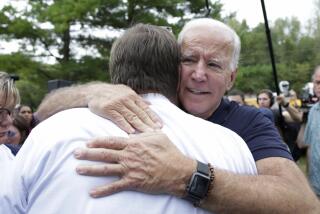Obama’s biggest challenge: Jobs
The central question facing Barack Obama’s 2012 reelection campaign is this: Can the president persuade voters to let him keep his job when so many of them have lost theirs?
Last week, after another run of bad economic news, the president and his staff tried their best to sound upbeat. In public, they barely acknowledged the alarming slump in the world’s financial markets; the numbers to look at, Obama said, were the Labor Department’s revised job creation estimates for the last three months. “The unemployment rate went down, not up,” he said on Friday. “Things will get better.”
But beneath the outward reassurance, some of the president’s advisors were grim. Yes, the rate of unemployment was down from 9.2% to 9.1%, but to most people, that looks more like flat.
And those numbers were a snapshot of the last two months. The markets, flighty and fallible though they be, are peering into the future — and they aren’t seeing much cause for optimism.
Next year, most forecasters expect unemployment to remain well over 8%. No incumbent president has won reelection with a jobless rate that high since Franklin D. Roosevelt in 1940 — and FDR was presiding over a robust recovery at the time.
As Obama’s departing economic advisor Austan Goolsbee noted recently, the administration has been counting on a rebound in the second half of the year to produce more jobs in time for election day. But now, with the U.S. recovery slowed to a crawl and Europe mired in a new debt crisis, a rebound is far from certain.
That makes it easy for Republican presidential candidates to frame their pitch to voters: Obama tried to fix the economy with a stimulus package, they say, and it failed. It’s time to try something else: lower government spending, which the GOP argues will increase business confidence and create jobs over the long run.
“I give the other side credit,” Obama said last week. “They are single-minded in their focus, in wanting to cut programs and shrink government.”
Obama’s message is more complicated. He wants to spend a little more money on job creation now, and cut the federal deficit later. By Labor Day, he plans to unveil a new program of modest job initiatives, including an extension of unemployment insurance benefits, a renewed payroll tax cut and a new “infrastructure bank” to fund construction projects.
But that pitch — essentially, a mini-stimulus — is complicated by the fact that Obama just spent a month mired in fierce negotiations over long-term spending cuts. With the leaders of both parties committed to spending less, the public was sold on the idea — including majorities even among Democrats and liberals, a CNN poll found.
That means Obama now has a tough sales job to convince the country that we should do more spending before we start cutting — especially at a time when his approval rating continues to decline.
Democratic strategists see particular danger signs for Obama in the defection of two groups that were important to his 2008 election, low-income white voters and young people. And they worry that the slippage has been caused primarily by the lingering economic distress.
To sway the skeptics, Obama will have to convince them that his approach really will produce more jobs, even though his efforts until now — principally his $787-billion stimulus package passed in 2009 — have fallen short of expectations. And he’ll need to persuade a contentious Congress to pass at least some of his ideas.
Some Democrats contend that the president can benefit even if Republicans in Congress block one or two of his proposals. Win or lose, they argue, he needs to pick a fight to make it clearer to voters what side he’s on.
That’s one reason for the inclusion in the package of extended unemployment benefits, a measure he knows conservative Republicans are opposed to. On Friday, House Republican leader Eric Cantor (R-Va.) obligingly made clear that he didn’t favor the idea. “For too long in Washington now we’ve been worried about pumping up the stimulus monies and pumping up unemployment benefits,” Cantor said. “Been there, done that.”
Obama’s proposal for an infrastructure bank may be easier to sell, in part because it’s backed by the U.S. Chamber of Commerce, the big business lobby — although if it passes, it’s unlikely to be as big as its sponsors once hoped. And a renewed cut in payroll taxes is likely to attract bipartisan support, especially if Obama extends it to employers as well as employees, as he has suggested.
Ultimately, though, Obama will be judged by results. If the unemployment rate recedes at all in 2012, he’ll be in a position to claim some credit. But unless the jobs picture improves significantly, he still faces an uphill battle.
More to Read
A cure for the common opinion
Get thought-provoking perspectives with our weekly newsletter.
You may occasionally receive promotional content from the Los Angeles Times.











